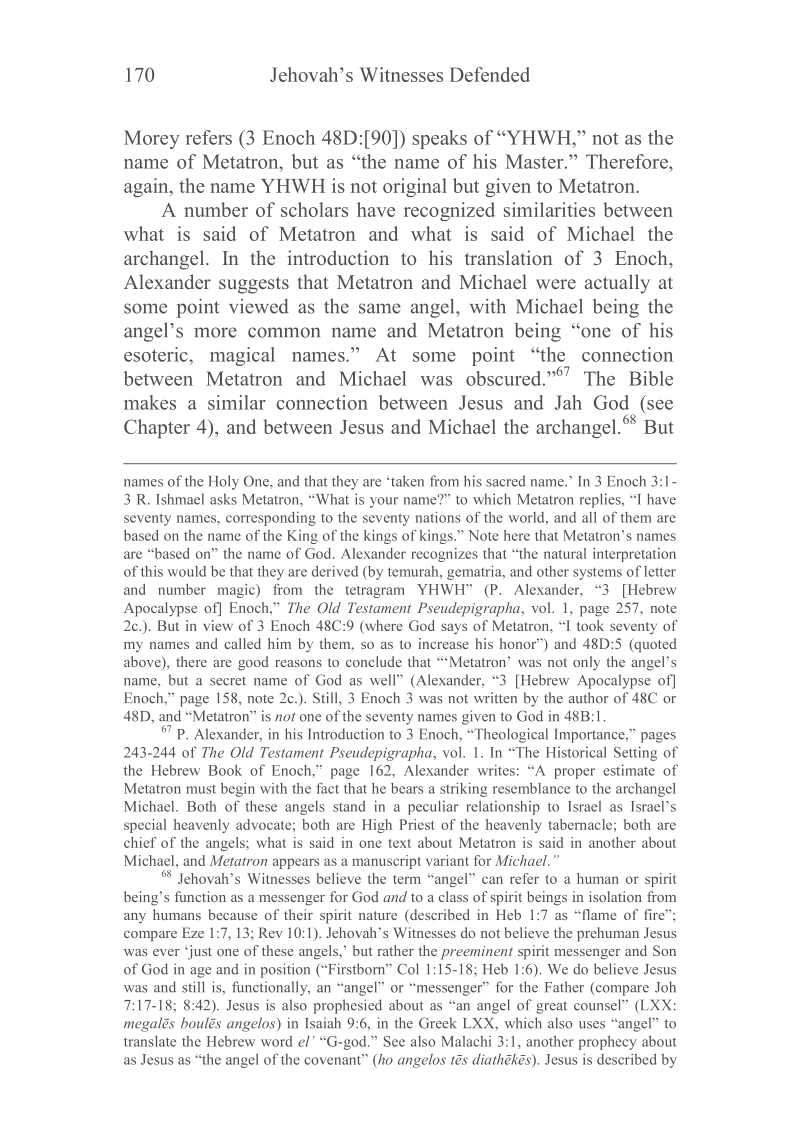Greg Stafford gives biblical reasoning why Jehovah's Witnesses identify the archangel Michael with the person of Jesus.
- Type
- Book
- Source
- Greg Stafford Non-LDS
- Hearsay
- DirectSecondary
- Reference
Greg Stafford, Jehovah’s Witnesses Defended: An Answer to Scholars and Critics, 3rd ed. (Marietta, California: Elihu Books, 2009), 170-71n68
- Scribe/Publisher
- Elihu Books
- People
- Greg Stafford, Michael
- Audience
- Reading Public
- Transcription
Jehovah’s Witnesses believe the term “angel” can refer to a human or spirit being’s function as a messenger for God and to a class of spirit beings in isolation from any humans because of their spirit nature (described in Heb 1:7 as “flame of fire”; compare Eze 1:7, 13; Rev 10:1). Jehovah’s Witnesses do not believe the prehuman Jesus was ever ‘just one of these angels,’ but rather the preeminent spirit messenger and Son of God in age and in position (“Firstborn” Col 1:15-18; Heb 1:6). We do believe Jesus was and still is, functionally, an “angel” or “messenger” for the Father (compare Joh 7:17-18; 8:42). Jesus is also prophesied about as “an angel of great counsel” (LXX: megalēs boulēs angelos) in Isaiah 9:6, in the Greek LXX, which also uses “angel” to translate the Hebrew word el’ “G-god.” See also Malachi 3:1, another prophecy about as Jesus as “the angel of the covenant” (ho angelos tēs diathēkēs). Jesus is described by Paul as by comparison “like an angel of God” (Gal 4:14 [ōs angelon theou]). As a spirit being, Jehovah’s Witnesses believe Jesus is also the only archangel actually mentioned by name in the primarily accepted biblical texts, namely, “Michael.” The reasons for this identification include the fact that Jesus has “an archangel’s voice” according to the Bible (which he uses to raise the dead [1Th 4:16 (compare Joh 5:25)]). In this passage from 1 Thessalonians Jesus is also said to have a “commanding call,” which is a further description of this “archangel’s voice.” These two things, (“an archangel’s voice” and “a commanding call”) belong to and define Jesus as a real person, whereas the “trumpet” Jesus has in 1Th 4:16 is an inanimate object though it, too, is said to be a part of the resurrection process according to Paul in 1Th 4:14-17 (compare 1Co 15:52). That is why I associate the “call” and the “voice” of 1Th 4:16 with the “voice” of the Son of God in Joh 5:26, and why I also associate the “trumpet” here with the trumpet of 1Co 15:52: They are all part of the resurrection process, or they described the resurrection that takes place through Jesus, the one with the “archangel’s voice.” If Jesus is not an archangel or, rather, the archangel, then describing him as having “an archangel’s voice” has no clear application in this context. Also, in standing up for one of the nations of the earth (God’s people Israel) in opposition to the “princes” of other nations (Dan 10:20), Michael is described as “one of the foremost princes” (Dan 10:13). But out of all of these “foremost princes” only Michael is called “the great prince” who ‘stands on behalf of the sons of your people’ (Dan 12:1). It is also only Michael, and “no one” else, who is “holding strongly” with the other spirit being mentioned in Dan 10, and it is only Michael who is called “the prince of you people” (Dan 10:21). So while the Bible does not present Jesus as ‘a mere angel,’ it does present him as the foremost of their order and as their “ruler,” since the angels are his to command (compare the references to “his angels” and to “my [= Jesus’] angel” in Rev 12:9 and Rev 22:16, respectively). This is consistent with Heb 1:5, which differentiates Jesus from the group of angels over whom he rules as God’s Son, as the archangel. Further, though Michael deferred to Jah when disputing with the Devil over Moses’ body (Jude 9), he was the one disputing with Satan and since that time Jah God has given Jesus “all authority ... in heaven and on the earth” (Matt 28:18). That is why since Jesus’ resurrection, and after Michael’s earlier encounter with the Devil regarding Moses’ body, Michael no longer defers to Jah but instead he “battled with the dragon” and defeated him (Rev 12:7-9). This historic conquest is an act truly befitting God’s Son, who “has become better than the angels, to the extent that he has inherited a name more excellent than theirs” (Heb 1:4). That “more excellent” name has been given to him through his exaltation by God the Father, so that now Jesus is King (Heb 1:8), having “sat down on the right hand of the Majesty in lofty places.”—Php 2:9-11; Heb 1:3.
- Citations in Mormonr Qnas
The B. H. Roberts Foundation is not owned by, operated by, or affiliated with the Church of Jesus Christ of Latter-day Saints.

